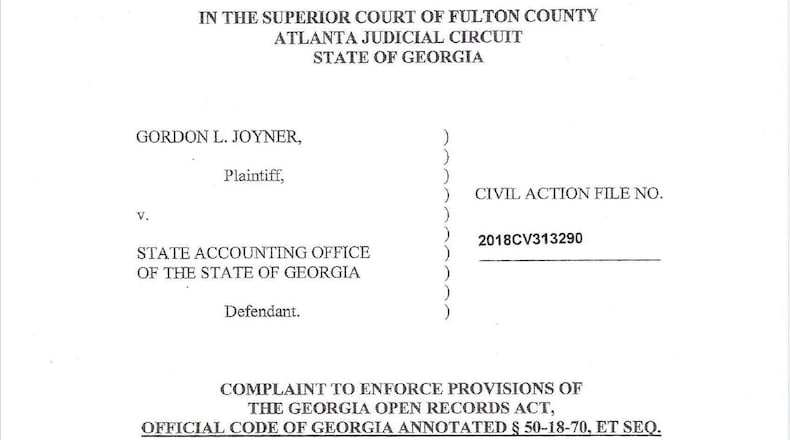An Atlanta lawyer spent more than a year trying to get public records from a state agency, turning to the attorney general's office for help enforcing the Open Records Act.
Now, the lawyer is suing the state agency for not complying with the law and the attorneys on the other side of the courtroom are the same people he went to for help: the attorney general’s office.
That’s a conflict of interest and should disqualify the attorney general from representing the agency in the dispute, Gordon Joyner, former head of the state Commission on Equal Opportunity, told a judge on Thursday.
But Assistant Attorney General Logan Winkles told the judge that the attorney general’s office “can assume a role as legal advisor and prosecutor” at its discretion when it comes to open records.
Office spokeswoman Katie Byrd later said the office's primary duty is to represent the executive branch of state government, including all state agencies. "We are unable to mediate complaints involving our own clients through our Open Government Mediation Program," she said.
That program was designed to help citizens who have trouble gaining access to public records and meetings from local governments.
Joyner was seeking records that pertained to state travel expense reimbursement requests, as well as travel regulations for state employees covering the years he was a state employee. He said the state has previously turned down some reimbursements he had filed for.
Joyner turned to the attorney general when the State Accounting Office failed to respond to his 2017 records request after nearly three months. The Open Records Act mandates that state and local government agencies either produce responsive records within three days of receiving a request or provide a timeline for when the records will be available.
According to documents provided by Joyner, soon after he sought help, Deputy Attorney General Wright Banks reached out to State Accounting Officer Alan Skelton, asking simply "You have this under control?" Skelton then emailed Joyner and said he would look into why a response had not been provided.
Despite that, Joyner says months went by without getting records. Finally, last November he sued.
The following month, the state turned over some of what he had requested, but he said he was told the rest of the records in question had been destroyed because they were more than five years old.
“It was just beyond the pale to me that even when I brought this officially to the attention of the…attorney general’s office, requesting their assistance, and making it happen and being totally cordial as reflected in all of my communications with them, cordial and hopeful and responsive and just … nothing,” Joyner said.
The attorney general’s office argued Thursday that the state has given Joyner all the records it has left that were responsive to his request.
Fulton County Superior Court Judge Shawn Ellen LaGrua seemed taken aback and asked again whether the state had turned over everything it had. When Winkles said it had, the judge responded silently with a puzzled facial expression and threw up her hands. Meanwhile, Joyner shook his head.
Winkles acknowledged that it took the State Accounting Office more than a year to provide Joyner with the materials it has turned over, but he did not say why it took that long. Nor did he address why the state turned over records to Joyner only after he filed a lawsuit.
“There was no excuse offered, no justification offered, there was no exception in the Georgia Open Records Act that was cited,” Joyner said after the hearing. “There was an admission that that entire period of time had went by with no response being made. And with the knowledge and active involvement of the state attorney general’s office, which is absolutely inexcusable and palpably bad.”
LaGrua heard arguments on the matter Thursday and said she would rule at a later date.
About the Author
Keep Reading
The Latest
Featured



